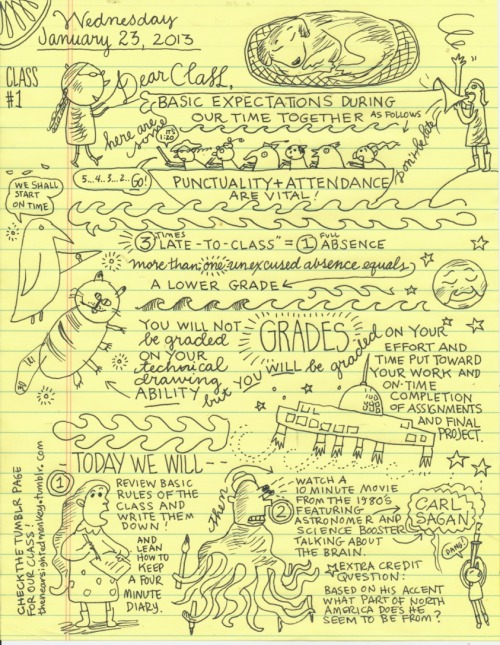> I will play on this blessed earth until I die
You're tuning into Cheers, a newsletter made by Tiffany Xie. This week: Lynda Barry's syllabus, adventures in laminated dough, a poetry podcast, and miracle fish.

Hello friend,
> Mostly wanderings in the digispace this week.
> Lynda Barry’s Tumblr for her comics classes is a treasure. The above is a little snippet from one of her syllabi.
> Cooking Samin Nosrat’s buttermilk roast chicken, double chocolate chip cookies, and also my first attempt at pain au chocolat (the butter broke but it was still tasty).
> My pretty tasty but left-something-to-be-desired attempt at pain au chocolat led me to r/Breadit, devoted to home bread baking, also the first subreddit that has made me seriously consider joining Reddit in a while.
> I watched Pulp Fiction. It’s funny, and fun to watch. Some parts made me cringe (were racial and homophobic slurs really needed? but why should I be surprised). It’s one of those films that immediately made it into the lexicon of references that my partner and I swap with each other.
> I’ve been listening to the Commonplace podcast, i.e. interviews with poets hosted by Rachel Zucker. I tried listening to a few episodes earlier this year and to be honest, I wasn’t sure if I liked it at first. It felt too honest, or too sincere, or I wasn’t sure what to make of people who live in poetry, but I find it exciting now, maybe because I know of more poets and it’s more exciting to me to listen to interviews with poets whose work I already love. I recommend the episodes with Tyehimba Jess and Anne Boyer.
> Reading: Bright Dead Things by Ada Limón. I was listening to an interview with Ada on the Commonplace podcast and it’s so beautiful, makes me want to pick up her other collections. The interview starts with a question about what it feels like to be nominated for prizes, but not win—thorny territory for me, who once wanted all the prizes and now wants to temper my ambition, to love the work I do a bit more—it was refreshing to hear her take on this, her thoughts on practicality over prestige.
> One of my favorite moments is when Limón describes being totally shocked at how much people love Bright Dead Things, saying that she wrote it for her her loved ones who weren’t writers, for “people who were complicated people living in the world and didn’t necessarily think about line breaks on a daily basis,” and for that reason it has become a book that people give to people who don’t read poems.
> “Miracle Fish” by Ada Limón:
I used to pretend to believe in God. Mainly, I liked so much to talk to someone in the dark. Think of how far a voice must have to travel to go beyond the universe. How powerful that voice must be to get there. Once in a small chapel in Chimayo, New Mexico, I knelt in the dirt because I thought that’s what you were supposed to do. That was before I learned to harness that upward motion inside me, before I nested my head in the blood of my body. There was a sign and it said, This earth is blessed. Do not play in it. But I swear I will play on this blessed earth until I die. I relied on a Miracle Fish, once, in New York City, to tell me my fortune. That was before I knew it was my body’s water that moved it, that the massive ocean inside me was what made the fish swim.
Cheers,
Tiffany